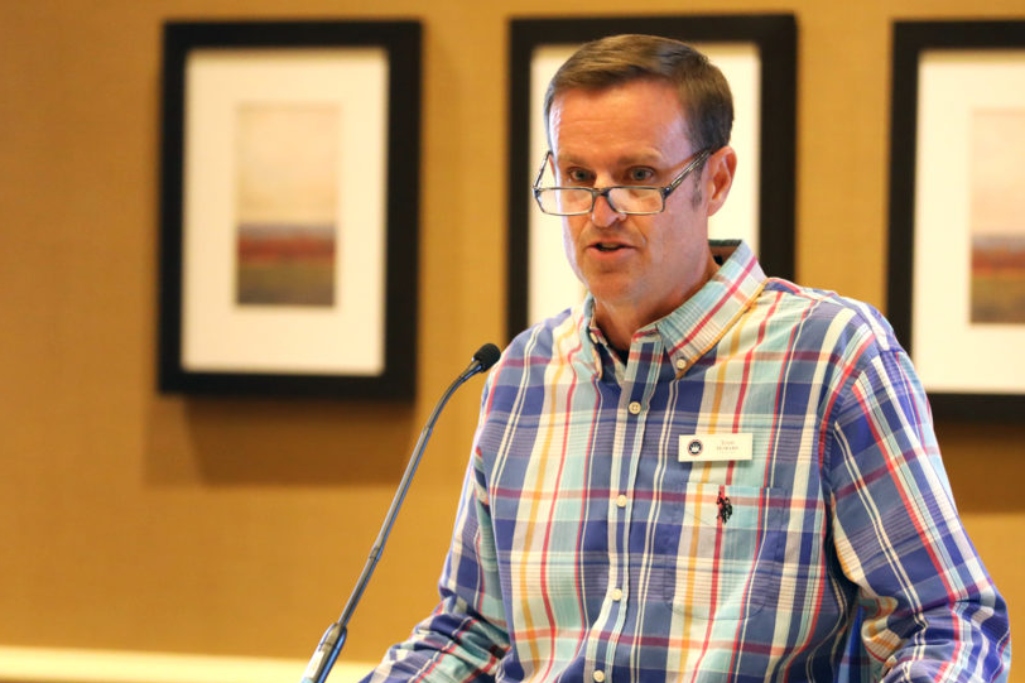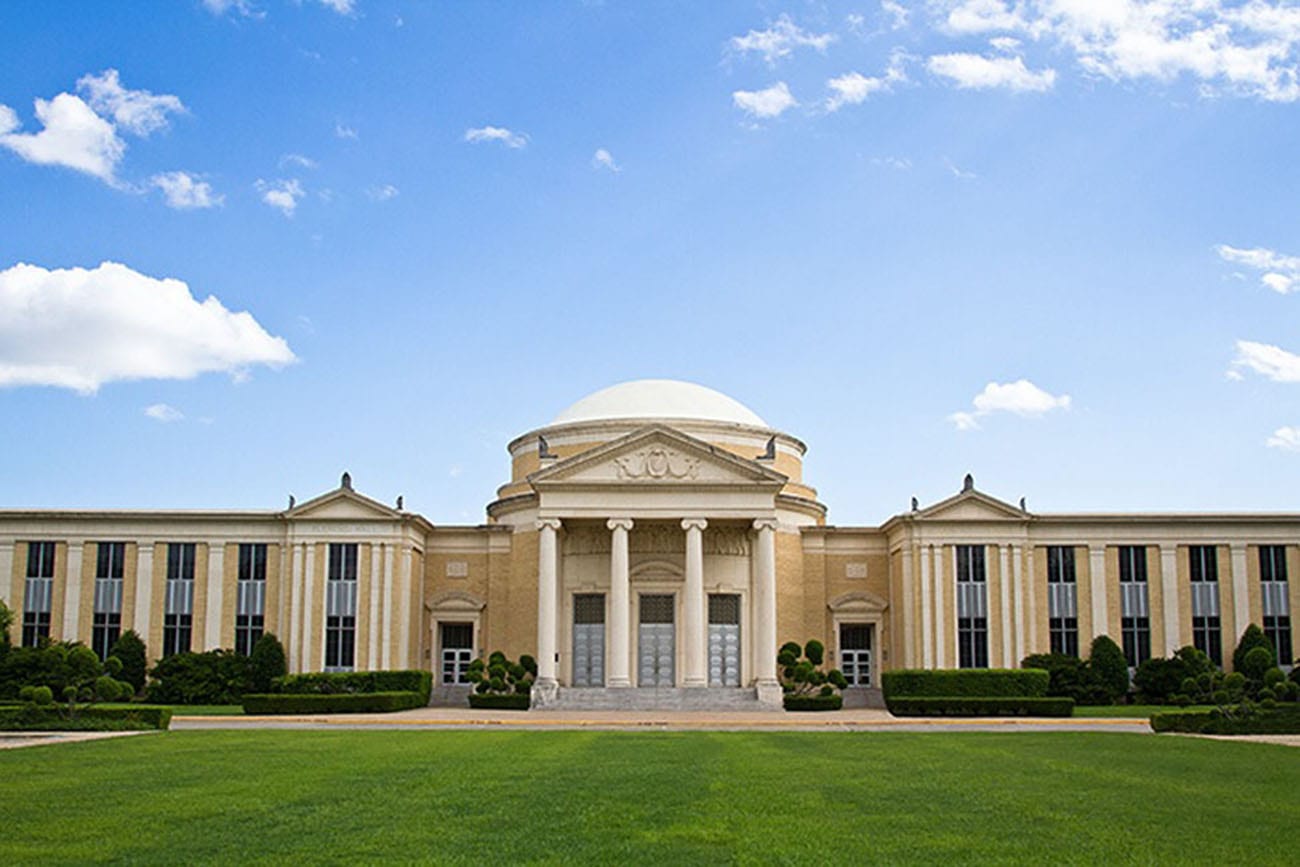
Todd Howard, chairman of the ERLC President Search Team, addressing fellow trustees at their in-person meeting in September.
The selection process for a new president of the Ethics & Religious Liberty Commission (ERLC) is progressing, trustees of the Southern Baptist Convention (SBC) entity were told Feb. 17.
Todd Howard, chair of the presidential search committee, provided a report on filling the leadership position for the ERLC during a trustees meeting held by means of an online video conference. The committee has the responsibility of bringing a candidate to the full trustee board to recommend as a successor to Russell Moore, whose resignation took effect in June 2021.
In other actions, the trustees approved without opposition:
- The selection of Guidepost Solutions as the outside organization to conduct an assessment of sexual abuse within the convention.
- Responses to motions referred to all SBC entities from the convention’s June 2021 meeting regarding audits and the use of non-disclosure agreements.
In his report, Howard said the committee had researched the people whose names it had received and reduced the list to three candidates for the ERLC presidency. After interviewing all three, the committee ranked them. The members decided they would deal with their top candidate “until that door closes,” said Howard, pastor of Watson Chapel Baptist Church in Pine Bluff, Ark.
“The main thing is everything is moving along well, and certainly in due course God’s man for this post will emerge,” he told fellow trustees.
With plenty of notice, the search committee intends to present its nominee during a full board meeting to give the trustees an opportunity to ask questions before a vote, Howard said. He offered no timeline for the remainder of the process.
The trustees endorsed in their September 2021 meeting a profile presented by the search committee that calls for the presidential candidate to be: (1) spiritually mature; (2) a faithful servant; (3) convictionally Southern Baptist; (4) appropriately educated; (5) an excellent communicator; (6) pastoral in heart; (7) an experienced leader and (8) a proven unifier.
The ERLC trustees’ endorsement of Guidepost Solutions to perform an assessment of sexual abuse in the SBC followed their approval in September of a request by a messenger to the 2021 SBC annual meeting to engage an organization for such an appraisal. Guidepost Solutions already is performing a third-party review of the SBC Executive Committee’s (EC) handling of sexual abuse issues.
Palmer Williams, the ERLC’s general counsel and senior policy advisor, told trustees the entity had received proposals from several organizations and reduced those to a list of a few it considered.
Guidepost’s “professionalism and the capacity that they had was really impressive,” she said, adding its staff is “trauma trained.” The ERLC observed the way Guidepost has carried out its investigation strategy of the SBC EC and the “really comprehensive survivor engagement strategy” it has had, Williams said.
Brent Leatherwood, the ERLC’s acting president, told the trustees Guidepost has “demonstrated a record of excellence in this area in any number of different contexts.” In its review of the SBC EC, Guidepost has shown “an understanding and respect for Baptist polity that I know is important to each and every one of us.”
Indiana Pastor Todd Benkert, who submitted the motion at the 2021 SBC meeting that called for the ERLC to hire an independent organization for the assessment, told trustees during the meeting the selection of Guidepost had his full support.
Benkert’s motion called for the assessment to take place over the next three years. Based on the motion, Guidepost is to assess “reports of sexual abuse and allegations of mishandling abuse, from voluntarily participating churches, victims and witnesses.” The ERLC is to report on the preliminary findings in 2022 and 2023 before offering a final report with recommendations at the 2024 SBC annual meeting, according to the motion.
Julie Myers Wood, Guidepost’s chief executive officer, participated in the video conference and told trustees any recommendation the organization makes would be guided by Baptist principles.
“We would anticipate allowing reporting channels through various means for this voluntary submission,” she said. “Ideally we would use some sort of automated tool surveys, as well as interviews” and “listening sessions.”
“[It] is not designed to be an investigation,” Wood said. “This is an assessment to look at trends and patterns. If there is something that comes forward and it relates to a potential investigation, of course our first duty is to protect the survivor and to ensure – if they want to – to report to” law enforcement.
The recommendation passed by the ERLC’s trustees also instructed the entity to enlist the Sexual Abuse Task Force (SATF) named by SBC President Ed Litton and other experts to serve as advisors during the assessment. The SATF announced in September it had chosen Guidepost to conduct the independent review of the EC. Messengers to the convention meeting in June of last year approved overwhelmingly a motion to establish such a task force.
The ERLC needs to engage the SATF and other experts “to ensure that we are serving our churches, equipping our pastors and other ministry leaders and responding to what the survivor community has rightly pointed out is an issue,” Leatherwood said.
“We believe this assessment can be done in a comprehensive way if it is carried out in a cooperative way,” he said. “We believe it calls for us to come alongside our churches, dig in deep with them on this issue and learn how instances of abuse have been handled or mishandled and in doing so begin to provide a true sense of the real scope of what our churches are up against and what our convention is facing.”
Jonathan Whitehead, an at-large trustee from Missouri, offered a motion at least partly related to sexual abuse for the ERLC’s staff to contact the SBC EC in an effort to present a joint recommendation to the convention. The proposal would expand the ministry assignment of the ERLC or another entity to include “to help the churches by offering them a confidential method of communicating to each other concerning issues about an individual’s fitness for service in churches or the SBC entities,” according to Whitehead’s motion. This would include “concerns about sexual assault and sexual predation, and could be accessed by any entity with a proper purpose,” the motion said.
The trustees approved with a few dissenting votes an amendment to Whitehead’s motion that instructed the ERLC’s Executive Committee “to explore the feasibility” of such a proposal and report to the board at the September 2022 meeting. The trustees passed the amended motion.
The board responded to a messenger’s request that each SBC entity report on its use of non-disclosure agreements (NDAs) by approving a statement that said the ERLC occasionally enters into NDAs as a requirement for doing business with some vendors. It also has occasionally used NDAs with “employment related agreements for the purpose of protecting the privacy of those involved,” according to the approved statement. The trustees added an amendment that said: “The ERLC has not and would not use non-disclosure language to protect anyone involved in sexual misconduct or sexual abuse.”
In its response to a messenger motion, the trustees approved a statement regarding audits that said the ERLC has an external financial audit performed every year. The audit report is shared with the entity’s trustees and the SBC EC. It also is published in the SBC Book of Reports and SBC Annual, according to the approved statement.
The trustees also endorsed without opposition a report from Bobby Reed, the entity’s chief financial officer, that showed the ERLC had a monthly net income of about $100,000 for each of the first four months of the fiscal year (October through January).
Some ERLC staff provided updates on efforts and accomplishments, especially since the September board meeting. Among those were:
- The fortifying of relationships “across our convention, with local churches, with local associations, with state conventions, with fellow entities,” including through meetings, Leatherwood said.
- Enactment in December of the Uyghur Forced Labor Prevention Act, a federal law that bans the importation of goods made by forced labor in China.
- The placement of or commitment to place a total of 32 ultrasound machines at pregnancy resource centers through the Psalm 139 Project.
- Completion by Jason Thacker, the ERLC’s chair of research in technology ethics, of “Following Jesus in a Digital Age,” which he wrote, and “The Digital Public Square: Christian Ethics in a Technological Society,” which he edited. The former is scheduled to be released in August by B&H Publishing and the latter next February by B&H Academic.
The other members of the presidential search committee are trustee chair Lori Bova of New Mexico, Traci Griggs of North Carolina, Christine Hoover of Virginia, at-large trustee David Prince of Kentucky, Juan Sanchez of Texas and A.B. Vines of California.
The ERLC’s annual trustee meeting is typically held in September. Thursday’s online meeting was the first to be held in winter or early spring since 1999.
(EDITOR’S NOTE – Tom Strode is Washington bureau chief for Baptist Press.)


